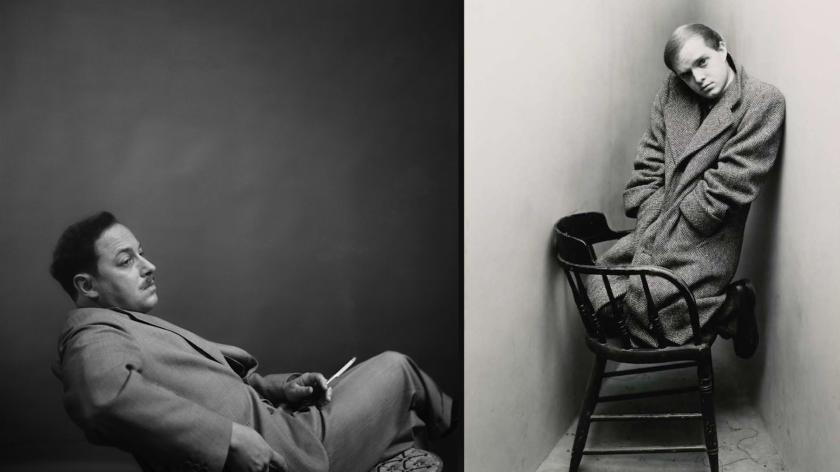Kindred literary spirits who overlapped in any number of ways make for riveting stuff in Truman & Tennessee: An Intimate Conversation. Filmmaker Lisa Immordino Vreeland folds archival footage of the legendary writers together with recitations from their life and art spoken by Jim Parsons and Zachary Quinto. Throw in footage of film adaptations of their work, ranging from A Streetcar Named Desire to Breakfast at Tiffany's and much more, and you have a riveting mosaic of two men marginalised by society who came to occupy pride of place in the cultural zeitgeist.
It's not only because both were subjected to intense scrutiny by David Frost in interview that they prove revealing, whether separately or in conjunction with one another. (Capote is hilarious staring Frost down when quizzed on the difference between sex and friendship.) Born 13 years apart, they died in the early 1980s within 18 months of one another, conjoined by acclaim and esteem alongside critical brickbats and self-doubt. Capote, for one, is seen telling the talk show host Dick Cavett that he wouldn't have wished his life on anyone only to die well before time, age 59. Williams made it to 71, alongside a career freefall evidenced in the last two decades and a self-avowed wish, he says, to have been better-looking.
And yet, Capote's disclaimer notwithstanding, what lives they would appear to have led! A devotee of gossip, Capote is seen to exist at the centre of an ongoing social whirl that he magicked into being, New York in his purview a fabled playground given over to glamour and celebrity and satisfying his thirst for fame. Williams (pictured above, photo c. Getty Images), in turn, tallied prizes aplenty (and, like Capote, a longterm boyfriend) before falling foul of the critics and undergoing a psychic freefall. Williams's Sweet Bird of Youth, we here discover, was at one point titled The Enemy: Time, and one is acutely aware in both instances of the ravages that can accompany degrees of adoration that perhaps arrive too soon. Telling reference is made in passing to "the fantasy of affirmation", which only begs the question as to what happens when that reality takes over and one is thrown back, anew, on what Williams's candidly refers to as his broken self.
Williams (pictured above, photo c. Getty Images), in turn, tallied prizes aplenty (and, like Capote, a longterm boyfriend) before falling foul of the critics and undergoing a psychic freefall. Williams's Sweet Bird of Youth, we here discover, was at one point titled The Enemy: Time, and one is acutely aware in both instances of the ravages that can accompany degrees of adoration that perhaps arrive too soon. Telling reference is made in passing to "the fantasy of affirmation", which only begs the question as to what happens when that reality takes over and one is thrown back, anew, on what Williams's candidly refers to as his broken self.
One notes similar backgrounds and upbringings as regards two gay men from the American South, each with a difficult parent, or sometimes two: Capote talks of a mother who "locked me in, and I still can't get out" whereas Williams was perpetually uncomfortable in the presence of his father. Drawn to a New York where reputations could be both made and mauled, they each spent sizable portions of their lives abroad, Williams cheekily lauding the beauty of Italy and its men, who appear to him always to be semi-erect (!). Flippant and bitchy (Capote casts shade on Williams's intelligence), the two are more than capable of analysis, both of themselves and others. Happiness, notes Capote, is as fleeting as a sneeze, or an orgasm, while sadness is Wiliams's constant companion: the author of The Glass Menagerie, with its rending portrait of the wounded Laura Wingfield, is nowhere more moving than when recognising the damage done to "my dear little Rose", his sister, who was lobotomised.
Immordino Vreeland's grandmother-in-law was the fearsome Vogue editor and societal arbiter Diana Vreeland, and one senses this filmmaker's comfort with a world that might seem too rarefied for some. (She's also done films on Cecil Beaton and Peggy Guggenheim.) The aural contributions of Parsons and Quinto, out gay actors amid a more accepting environment unknown to the two writers whom they here honour, neatly elide past and present, Quinto having played Tom in the Cherry Jones-led Broadway revival of Menagerie that traveled to London (mostly) recast.
Footage ranges from the familiar (Blanche's first encounter with Stanley in Streetcar, as Brando famously removes his t-shirt) to the lesser-known: Boom!, the 1968 film signalling one of the many screen collaborations between Williams and Elizabeth Taylor. One clocks Williams's suggestion that filmgoers leave movies of his plays five minutes before the end so as not to endure the indignities wrought by censors, just as Capote is poignantly heard wishing he could be invisible - this from the self-invented personality who spoke of "[being] famous for being famous". Disappointment in both cases seems somehow to dog them to the end, even as Truman & Tennessee leaves one more eager than ever to feast anew on their shared genius.















Add comment